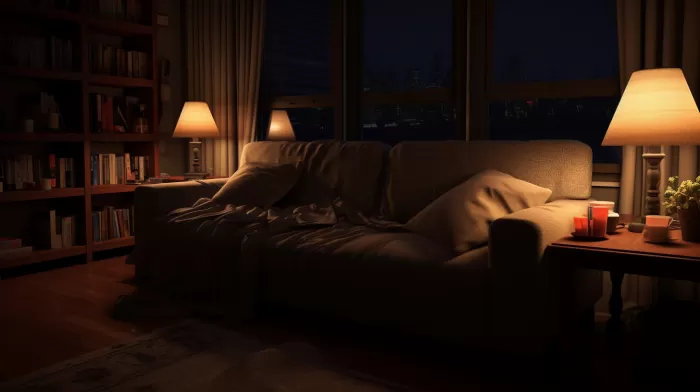Too much bright light before bedtime doesn’t just make it harder to fall asleep, it’s also linked with cognitive and mood issues. As you prepare for bed, consider dimming the lights in your home. Adapting this routine has been shown to improve emotional and cognitive health, giving your brain the boost it needs.
The dangers of bright lights at night
Researchers at Johns Hopkins University have found that exposure to nighttime bright light is tied to depression and learning difficulties. The cause isn’t from lack of sleep, but rather from the bright lights found in our homes from lightbulbs, computers, and iPads.
Chronic exposure to low levels of bright light disrupts the balance of stress hormones in the body, causing mood disorders and negatively impacting cognitive function. This is due to the fact that bright light disrupts the natural production of melatonin in our bodies, a hormone that regulates sleep and wakefulness, as well as mood and cognitive abilities.
Less obvious sources of bright light
Some sources of bright light are not immediately apparent. While many of us are aware of the common culprits, like television screens and overhead lighting, there may be other sources that you are unaware of. These sources include:
- LED lighting: Many LED bulbs give off a cold, bright light that may be harmful to your emotional and cognitive health. If you are using LED lighting in your home, consider switching to a warmer, lower-lumen bulb for evening use.
- Blue light: Computer, tablet, and smartphone screens emit a type of blue light that has been shown to disrupt sleep and impair cognitive function. To minimize your exposure to blue light, switch your devices to night mode, download a blue light filtering app, and avoid using them within two hours of bedtime.
- Ambient light: Ambient light from streetlights or a neighbor’s porch light may seep through your window and impact your sleep and learning abilities. Consider investing in blackout curtains or shades to block out unwanted light sources.
Creating a soothing nighttime environment
Once you’ve checked for any hidden sources of bright light that may be causing harm, take some steps to create a calming environment that promotes better cognitive function and relaxation. Some suggestions include:
- Swap out your high-wattage bulbs for softer, lower-wattage ones. A warm-toned bulb between 25 and 40 watts is an excellent option.
- Opt for lamps and sconces that direct light downward, as this provides a more subdued glow.
- Install a dimmer switch on your overhead lighting, allowing you to control the level of light as the evening progresses.
- Consider using candles or fairy lights as an alternative lighting source, as they give off a gentle glow that is not overpowering.
The benefits of a dimly-lit evening
First and foremost, following a dim-light routine can positively impact your mood. Studies have shown a link between decreased light exposure at night and reduced instances of depression. By limiting light exposure, you may be able to ward off symptoms of low mood while promoting a sense of well-being.
Improved cognitive function is another benefit brought on by less exposure to bright light at night. A decrease in light exposure may help sharpen your learning abilities and your memory. Furthermore, limiting exposure to artificial light at night has been linked with better sleep quality and duration, ultimately leading to improved overall health.
Conclusion
Adopting a simple evening routine that involves dimming the lights in your home can have a profoundly positive impact on your well-being. Boost your brainpower, improve your mood, and reap the benefits of a healthier emotional and cognitive state by just turning down the lights in your house and bedroom. In the quest for better health and happiness, a dimmer switch might just be your secret weapon.



